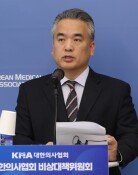President Park’s restructuring drive hits snag
President Park’s restructuring drive hits snag
Posted April. 30, 2016 07:19,
Updated April. 30, 2016 07:26
Yoon Myun-shik, assistant deputy governor of the central Bank of Korea (BOK), told a briefing on its monetary policy that the quantitative easing proposed by President Park Geun-hye is “different from the quantitative easing that central banks usually do." He added, “No matter how urgent it might be, I think following due procedure is in line with what the BOK stands for... The due procedure here is to form a public or social consensus.” The central bank expressed its negative position on the administration’s proposal for a “Korean-style quantitative easing” just three days after the president urged called for a positive consideration of the monetary policy.
Finance Minister Yoo Il-ho on Friday opposed a proposed supplementary budget to finance corporate restructuring. While the central bank cites a “due procedure,” the finance ministry is reluctant to the financing plan under the excuse of taxpayers’ money.
It is worrisome that the government and the central bank that call the shot in corporate restructuring are dancing to different tunes. In addition, the state-funded Korea Credit Guarantee Fund, a creditor of the troubled Hanjin Shipping Co., has also announced that it will start collecting its loans to the company. Under previous administrations, there had never been such a cacophony over the government’s corporate restructuring plan. In 2009, right after the onset of the global financial crisis, it took just two weeks for the government to raise 20 trillion won (17.5 billion U.S. dollars) for corporate restructuring and conclude a concrete plan to bail out troubled companies. President Park might have wanted to show off her leadership by taking the initiative of quantitative easing but ended up showing signs of her becoming a lame-duck president. If the most sensitive corporate restructuring is shaken by the lame-duck leadership, it would also have negative impact on Korea’s credibility.
While the government, the central bank and creditors are running helter-skelter, labor unions are getting ready to resist restructuring. The labor union of Hyundai Heavy Industries Co. plans to hold a rally in Seoul over the weekend with a view to winning wage increases. Hyundai Motor’s labor union has demanded that its members be granted the right to reject promotions. Probably, its intention is to refuse a proposed annual salary system and secure as many members as possible. While labor unions are making thorough preparations for struggles, the government’s commitment to restructuring looks too frail.
The Korean-style quantitative easing is a mere means of reform but not the core. It might support the Korea Development Bank’s restructuring. However, the government should not overlook the possibility that the money injected into the bank will result in market capital reduced that much. There are many other options to provide restructuring funds for state-run banks, including the central bank’s special loans or bond purchases. If the government’s cacophony undermines public confidence over restructuring, it will be off to a wrong start. The government’s economic team should quickly draw up optimal restructuring measures by analyzing all variables.







